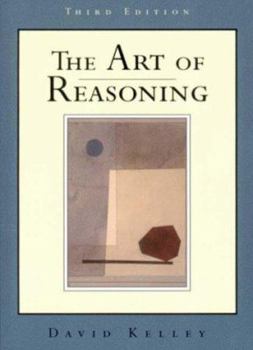The Art of Reasoning
Select Format
Select Condition 
Book Overview
The Third Edition has been meticulously updated and continues the successful pedagogical approach of the two previous editions, guiding students through the fundamental elements of formal deductive logic, classification and definition, fallacies, basic argument analysis, inductive generalization, statistical reasoning, and explanation.
Format:Paperback
Language:English
ISBN:0393972135
ISBN13:9780393972139
Release Date:January 1998
Publisher:W. W. Norton & Company
Length:704 Pages
Weight:2.08 lbs.
Dimensions:1.1" x 6.5" x 9.2"
Customer Reviews
4 ratings
The Perfect Introduction to Logic
Published by Thriftbooks.com User , 23 years ago
Although I originally learned logic using Hardegree's _Symbolic Logic_, Kelley's book is a vastly superior text for teaching logic to students and inspiring interest in the subject. Many academics complain that you can't teach Critical Reasoning without covering Aristotelian & symbolic logic; they then complain that Aristotelian & symbolic logic is of no importance or interest to non-philosophy majors, and so that it would be preferable to teach Critical Reasoning. David Kelley accomplishes something incredible in this book: he teaches BOTH, and he shows how they are connected. He starts the reader off with a general discussion of concepts, definitions, and propositions. Then he shows the reader how to analyze the basic structure of arguments, using op-eds and Supreme Court decisions as illustrations. He then moves into Aristotelian logic, venn diagrams, and the informal Fallacies. After this, he discusses sentential logic and the canonical patterns of inference. In the next section, he introduces the Russell/Frege predicate calculus (and Fred Sommers' term logic) and shows how it expands the precision of argumentative analysis. Finally, he discusses inductive logic, including how to generalize correctly, how to evaluate arguments by analogy, and how to form and test hypotheses. This is a perfect introduction to logic because it teaches one how to think clearly ("in a straight line," as Flew once put it) about issues that one encounters in ordinary life. At the same time, it equips the student who wants to go further in philosophy with the powerful (Russell/Frege) analytic techniques appropriate to that task. There is NO CHANCE that a student who reads this book will be left wondering about the importance of logic. In addition, Kelley is an expert communicator, and he explains away many of the confusions that people have about reason and logic in our "postmodern" age.
Accessible and Rigorous Introduction to Logic
Published by Thriftbooks.com User , 24 years ago
David Kelley's book is a well-conceived introduction to logic. I think that the first few chapters, on concepts and definitions, are a nice way to begin thinking about what is involved in thinking. These chapters, as well as subsequent ones, are clear at the same time that they are rigorous. I have used this as a textbook for introductory logic classes, and while there are many others that cover the same material, I have yet to find one that surpasses its basic accessibility without sacrificing rigor. There are however, it should be mentioned, a few typos in the exercises. I would also like to point out with respect to the reviews above that criticize the book on the basis of Kelley's interest in objectivism, that if the reviewer(s) had read the book, they would have been able to recognize at least two fallacies implicit in their review: ad hominem & poisoning the well. In any case, as far as I can tell, Kelley's views on objectivism have nothing to do with the presentation or content of the text.
An excellent introductory book on logic
Published by Thriftbooks.com User , 26 years ago
David Kelley illustrates the essentials of logic with a lucid exposition of the methods of right reasoning. Professor Kelley offers a guide to this crucial and - given the nature of much of the material that rolls out of our printing presses - often neglected science, that is accessible to the uninitiated reader. The section in his book on the term logic of philosopher Fred Sommers, an Aristotelian alternative to the Fregean, mathematical approach to symbolic logic, is especially interesting. I highly recommend this work.
An outstanding book by an outstanding teacher!
Published by Thriftbooks.com User , 27 years ago
An outstanding book by an outstanding teacher! Five stars (*****) for his treatment of concepts, classification and definitions. Even though I'm familiar with the material, I expect to reread Kelley's book many times. I especially enjoy his simple, down-to-earth language excellent examples concise discussion of essentials coverage of every important topic Every reader will benefit from his highlighting summary boxes chapter summaries minimum of technical jargon






